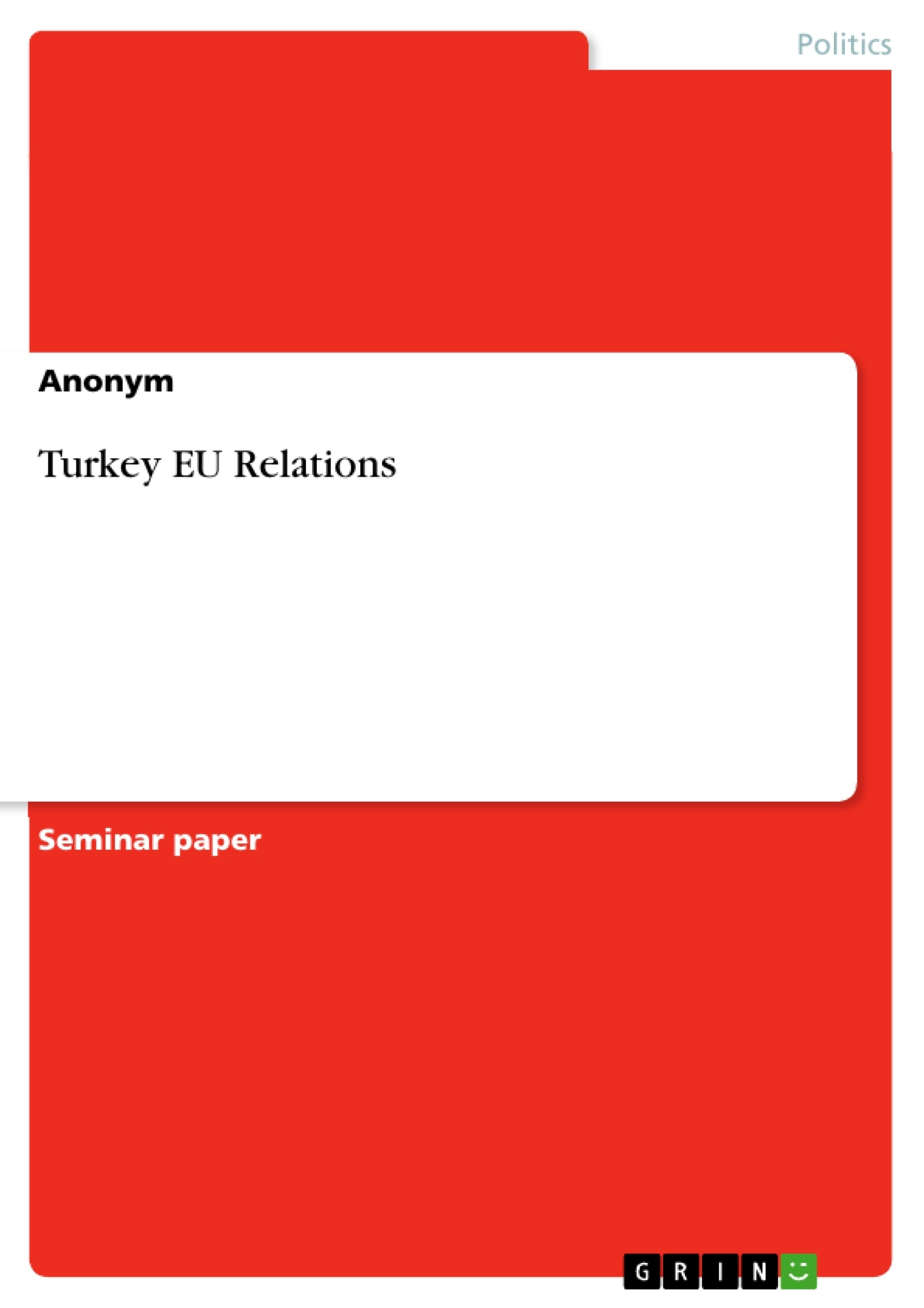This term paper deals with the question whether Turkey has a realistic chance in the current position of becoming a full member state. First, the current state of developments and the historical relationship between Turkey and the EU is supposed to be examined, followed by an analysis of the current state of negotiations referring to use of the Copenhagen criteria. Finally, the chances of Turkey's full membership on the basis of the various positions of European institutions and member countries are going to be estimated.
Inhaltsverzeichnis (Table of Contents)
- Introduction
- Historical development of the relations between the EU and Turkey and the current status
- The current status of the Turkey-The Copenhagen criterias
- Die Copenhagen criteria
- Current Status of the political criteria
- Current status of the economic criteria
- Current Status on the Acquis- criteria
- Capacity of the European Union
- Chance of becoming a full member? - Current position of the EU and its institutions
- EU Commission
- The European Parliament
- Current position of selected member states
- Conclusion
Zielsetzung und Themenschwerpunkte (Objectives and Key Themes)
This paper examines whether Turkey has a realistic chance of becoming a full member state of the European Union. It analyzes the historical relationship between Turkey and the EU, evaluates the current state of negotiations in light of the Copenhagen criteria, and explores the perspectives of European institutions and member states regarding Turkey's potential membership. Key themes and objectives of the paper include:- Historical evolution of EU-Turkey relations
- The impact of the Copenhagen criteria on Turkey's accession process
- The role of various EU institutions in shaping Turkey's membership prospects
- The influence of member states' positions on Turkey's accession
- The likelihood of Turkey becoming a full member of the EU
Zusammenfassung der Kapitel (Chapter Summaries)
Introduction
The introduction presents the context for the paper, outlining Turkey's long-standing bid for EU membership and the complexity of its integration into the European Union. It highlights the initiation of accession negotiations in 2005, emphasizing that the process is long and arduous with no guaranteed outcome. The paper aims to assess Turkey's chances of achieving full membership, analyzing its historical relationship with the EU, the current state of negotiations, and the positions of key EU actors.Historical development of the relations between the EU and Turkey and the current status
This chapter traces the evolution of EU-Turkey relations, emphasizing the strategic and geopolitical factors that shaped their interactions. It underscores the initial desire for closer ties between Turkey and Europe following World War II, driven by Turkey's strategic location and proximity to the Soviet Union. The chapter explores the tensions arising from the Cyprus issue and the competing aspirations of Turkey and Greece for Western integration. It details the establishment of the Association Agreement between Turkey and the EEC in 1964, which outlined a multi-phase program aiming to harmonize Turkey's economic and political system with EU standards. The chapter further highlights the setbacks and obstacles Turkey encountered in its bid for membership, including military coups, the Cyprus crisis, and the enlargement of the EU to include Greece, Spain, and Portugal, which prioritized political considerations over Turkey's candidacy. This chapter also describes the current state of the negotiations, which are stalled. The EU has paused eight of the thirty-five sections of the negotiation talks, largely due to trade issues. The EU demands that Turkey open its ports and airports to Cyprus, leading to a counter-demand from Turkey.Chance of becoming a full member? - Current position of the EU and its institutions
This section analyzes the positions of key EU institutions on Turkey's potential membership. It examines the stance of the European Commission, the European Parliament, and selected member states, providing insights into the challenges and opportunities Turkey faces in its bid for full membership.Schlüsselwörter (Keywords)
This paper explores the complex relationship between Turkey and the European Union, focusing on the historical development of their ties, the impact of the Copenhagen criteria on Turkey's accession process, the role of various EU institutions in shaping Turkey's membership prospects, the influence of member states' positions on Turkey's accession, and the likelihood of Turkey becoming a full member of the EU. Key concepts include EU enlargement, accession negotiations, Copenhagen criteria, strategic partnerships, geopolitical factors, and national interests.
Excerpt out of 18 pages
- scroll top
- Quote paper
- Anonym (Author), 2012, Turkey EU Relations, Munich, GRIN Verlag, https://www.grin.com/document/194878




